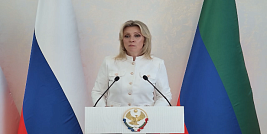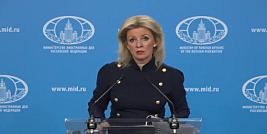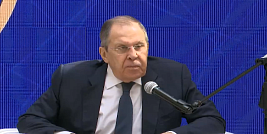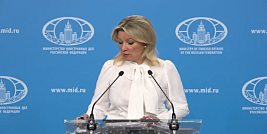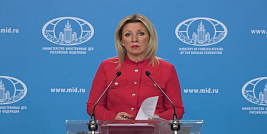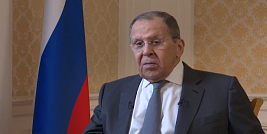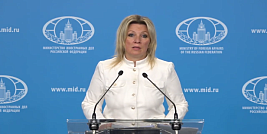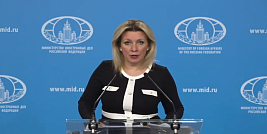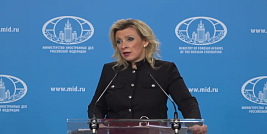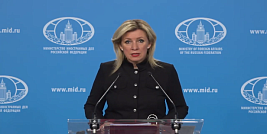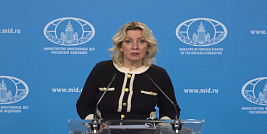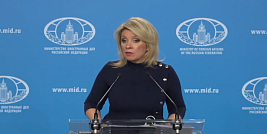Briefing by Deputy Director of the Foreign Ministry's Information and Press Department Andrey Nastasyin, Moscow, July 3, 2024
- Ukraine update
- Briefing by Ambassador-at-Large on the Kiev Regime’s War Crimes Rodion Miroshnik
- Moldova update
- London and its loyalists
- Independence Day of Belarus and the 80th anniversary of the liberation of Minsk from the Nazi invaders
- UN General Assembly resolution on World Swahili Language Day
- The Znaniye.Award project
- UNESCO Director-General’s inaction to condemn attacks on Russian journalists
- Foreign ministers of Azerbaijan and Armenia invited to participate in the upcoming NATO summit
- First round of parliamentary elections in France
- New anti-Russia statements by the Baltic countries
- China’s role in the SCO development
- Finland approves defence cooperation agreement with the United States
- Sergey Lavrov’s meetings during Russia’s presidency of the UN Security Council
- Hungarian Prime Minister’s visit to Kiev
- NATO’s new “designs”
- Certain statements by Armenia’s Prime Minister regarding the country’s joining the EU
- Statements by the US Assistant Secretary of State for European and Eurasian Affairs
- Russia-Kazakhstan relations
- Lack of opportunity to vote in the Russian presidential election in Georgia
On July 2, we marked two years since the liberation of Lisichansk, Lugansk People’s Republic. Cossack units, where many fighters were local people, made a great contribution to that victory. The city’s devastation was avoided thanks to their concerted actions with the Akhmat Battalion and units of the 2nd Army Corps of the People’s Militia of the Lugansk People’s Republic. Restoration work on critical infrastructure began immediately after the city’s liberation.
The Republic of Tatarstan is providing assistance to rebuilding Lisichansk, which was seriously damaged during the Ukrainian occupation. About 900 million roubles have been invested. A city hospital and three schools have been renovated. The water and electricity systems will be relaunched soon. Regrettably, the city’s proximity to the frontline is hindering the renovation of Lisichansk that remains a target of barbarous attacks by the Ukrainian forces. Deputy Prime Minister of Russia Marat Khusnullin has said that the construction of housing and social facilities will continue nevertheless.
We are sure that peace will soon be restored in Lisichansk, one of the oldest cities in Donbass (it was established in 1710), and that it will be given new momentum to development and prosperity as part of Russia, its historical homeland.
The Kiev regime continues to deliberately target civilians in Russian cities and villages. The Ukrainian Nazis are acting more and more deviously with the use of modern weapons. The most dreadful thing is that children often become victims of such attacks.
On June 29, 2024, the Bandera butchers dropped a bomb from a drone on a house in Gorodishche, Kursk Region, killing five people, including two children.
On June 30, 2024, they used a drone to attack a car with a family of five near Novoye, Belgorod Region. As a result, a four-year-old girl was killed, and adults were wounded.
There is no doubt it was a deliberate action. The drone operators definitely saw who they were targeting.
On June 30, 2024, two underage civilians and four service personnel of the Emergencies Ministry of Russia were wounded in a Ukrainian attack by US-supplied HIMARS systems on Yasinovataya, Donetsk People’s Republic.
The same day, a Ukrainian shell exploded near a public transport stop, killing a woman and wounding a family of three.
The Bandera bandits continue to target civilian infrastructure, schools, hospitals and kindergartens.
On June 28, 2024, they launched a drone attack on an oil depot in the Tambov Region. On June 30, they directed their strike at the Novolipetsk metallurgical plant. On July 1, they used a Grad multiple-launch rocket system against school in Donetsk and the Belgorod Region’s largest poultry farm in Novaya Tavolzhanka, killing one person and wounding two.
The Russian law enforcement authorities register the crimes of the Ukrainian neo-Nazis. The culprits will be identified and called to account.
There is a punishment for every crime.
Courts in the Russian Federation continue to convict Ukrainian militants for serious crimes against civilians, relying on the evidence provided by the Investigative Committee of Russia.
On July 2, the Basmanny Court in Moscow moved to arrest in absentia a number of representatives of Ukraine’s political and military leadership on charges of using prohibited military capabilities and methods of warfare. The suspects in this criminal case include former Prime Minister Vladimir Groysman, former Foreign Minister Pavel Klimkin, former Finance Minister Alexander Shlapak, and Commander of the Rapid Reaction Forces Igor Dovgan. Each of them faces up to 20 years in prison.
On June 25, the Investigative Committee announced the results of an investigation into the crash of the IL-76 plane in the Belgorod Region on January 24 that killed a group of Ukrainian prisoners of war, as well as several Russian military and flight crew. It was established that the aircraft was attacked by anti-aircraft guided missiles fired from a US-provided Patriot system in the Kharkov Region. The investigators have obtained information as to which Ukrainian army units have this equipment, and are working with the Russian Defence Ministry to identify everyone involved in this inhuman crime.
On June 17, commander of a Ukrainian anti-aircraft brigade Nikolai Dzyaman was charged in absentia with giving the order to destroy a Russian Aerospace Forces aircraft that was patrolling our airspace on February 23. He was aware that the aircraft was not intended for combat operations and carried no weapons, and that the flight took place within Russian airspace. His criminal actions resulted in the loss of 10 flight crew lives and the destruction of the aircraft.
Several foreign mercenaries who fought on the side of the Kiev regime were sentenced in absentia in late June. Swedish citizen Mathias Gustafsson, Croatian citizen Vjekoslav Prebeg and British citizen John Harding were each sentenced to 23 years in prison; US citizen Mark William Ellerbroek was sentenced to 14 years in prison. Two other British citizens, Andrew Hill and Dylan Healy, were sentenced to 3.5 and 4 years, respectively.
None of the Ukrainian criminals and their henchmen will be able to escape punishment. They will be held accountable to the fullest extent of the law.
On June 28, Vladimir Zelensky extended greetings to Ukrainians on Constitution Day. It looked like a blatant mockery of the country’s citizens as well as its basic law. There is no way a person who has usurped power could be considered a guarantor of the Constitution in a democratic and law-based state. However, this is quite possible in Ukraine, because non-abidance by laws has become the norm there.
The current Kiev regime has virtually violated every single article of the Ukrainian Constitution.
The provisions guaranteeing “freedom of political activities and the prohibition of censorship” (Article 15), “free development, use, and protection of [the] Russian” [language] (Article 10), the “right to freedom of beliefs and religion” (Article 35), “the right to freedom of thought and speech, and to free expression of his views and beliefs” (Article 34), “the inalienable right to life” (Article 27) and respect for human dignity (Article 28) have been trampled underfoot.
Instead of a free democratic state, as is envisaged by the Constitution, Ukraine has turned into a totalitarian neo-Nazi regime, where fundamental human rights and freedoms are systematically violated, and citizens are not even held hostage – they have been turned into actual slaves of Bankovaya.
Every day, we witness encroachments on human dignity and the right to life as we watch military conscription officers abduct Ukrainian men and forcibly ship them to the frontlines. For them, people are expendable material, and Zelensky’s junta has no qualms about sacrificing them in the name of self-preservation and the self-serving interests of its actual masters.
The road to Europe, which Zelensky covered in his “congratulations” much more extensively than the Constitution itself, is paved with dead Ukrainian citizens. This is the price Ukraine pays to have Western capitals welcome the illegitimate leader of the criminal regime and to provide him with multi-billion dollar aid, so that he could keep on indulging his ego. Condolences, not congratulations, are a far more suitable choice given the circumstances. Time will tell how long ordinary Ukrainians, who have become a bargaining chip in Zelensky and his overseas handlers’ ambitious game, will put up with this.
Interestingly, on May 14, a court in Nikolayev ruled to release from the military enlistment office a person liable for military service, who, the court ruled, was detained illegally. On the face of it, this is a precedent of protecting Ukrainian citizens from arbitrariness. However, we haven’t heard of any other such decisions since May. Clearly, rumours about independent Ukrainian judicial authorities are greatly exaggerated.
The inhuman crimes perpetrated by the Zelensky regime are dragging Ukraine deeper and deeper into a debt hole.
On June 17, Reuters reported that Kiev had failed to reach an agreement with the bondholders regarding the restructuring of its international debt worth nearly $20 billion. Talks held in June fell through. An agreement under which Ukraine could suspend payments after the beginning of the special military operation will expire in late July. During the talks, the Ukrainian side begged for extending the debt repayment period or writing off a portion of it, backing its requests by economic headwinds and hostilities.
Isolated Western creditors could meet some of Kiev’s demands, but private bondholders, such as Black Rock, Amundi and Amia Capital (which are holding almost 20 percent of outstanding Eurobonds), do not see this option as viable. Back in May, The Wall Street Journal reported that Ukraine’s private bondholders want Kiev to resume interest payments under the government debt in 2025. Amid flourishing embezzlement, they have every reason to be concerned about the prospect of getting back at least a small portion of their funds. Apparently, they are well aware of who they are dealing with and are not making any concessions to the Bankovaya Street. Clearly, the bargaining will continue, and Ukraine and what is left of its economy and resources will again be used as the bargaining chip. Zelensky’s regime is willing to auction the country off.
Even though Finance Minister of Ukraine Sergey Marchenko is certain that the government will be able to reach an agreement by August 1, things are not that straightforward. The likelihood of a default is high. According to experts, even if Ukraine can avoid it this year, the risk of default in 2025 runs at 60 percent, and in 2026 at 80 percent.
As a reminder, the sovereign debt of Ukraine increased by 61.8 percent from February 28, 2022 to March 31, 2024 to a total of $151.05 billion. According to the IMF estimates, by late 2024 it will amount to 94 percent of GDP, or $159bn. Over two years, the foreign borrowings have grown by 90.1 percent to a record high of $108.37 billion. All of that puts a heavy burden on future generations of Ukrainians, who will have to pay for the Kiev junta’s crimes and squandering for the rest of their lives.
In addition to massive debt which, as we have pointed out on many occasions, Ukraine’s future generations will have to pay off, the Kiev regime is trying to conclude as many agreements as possible.
On June 27 in Brussels, Ukraine signed 18th, framework agreement on “security guarantees.” This time, the EU was the signatory. Like all other documents of that kind, this agreement is declarative in nature and does not contain any binding obligations. It provides for 50 billion euros in assistance to Kiev, which is included in the EU budget for the next four years as part of the Ukraine Facility support package, “long-term provision” of military and military-technical assistance to the Ukrainian forces, support for the Zelensky formula, continuation of anti-Russia sanctions, and efforts to use the proceeds from blocked Russian assets and to hold Russia accountable.
The fact of signing these agreements turned the heads of many in Kiev. They took it that starting now the country would be guaranteed to receive the funds to fight Russia. According to Prime Minister Denis Shmygal, their annual volume will amount to almost $60 billion and be spent on military needs. At the same time, Ukraine prefers to ignore Western demands to eradicate corruption and to provide detailed accounts of spending the allocated funds and other things.
Notably, the IMF recently demanded that Kiev amend the Customs Code and conduct an external audit of the National Anti-Corruption Bureau of Ukraine by late September in order to step up the fight against corruption and to continue international financial support. Clearly, the scale of embezzlement is so much through the roof that Westerners have no choice but to start tightening the screws. Will that help? We’ll see.
The above facts once again confirm the importance of the special military operation goals to denazify and to demilitarise Ukraine and to eliminate threats emanating from its territory. All of them will be achieved no matter what.
Briefing by Ambassador-at-Large on the Kiev Regime’s War Crimes Rodion Miroshnik
We would like to remind you that the Foreign Ministry’s Ambassador-at-Large on the Kiev Regime’s War Crimes, Rodion Miroshnik, will hold an online briefing at 11 am on July 5 at the ministry’s press centre.
He will provide facts about the most heinous violations of the international humanitarian law committed by the Kiev regime and its sponsors in the first half of 2024, such as crimes against children, the use of Western-supplied long-range weapons and drones against civilians, and political assassinations.
As usual, we will provide simultaneous translation into English, French and Spanish.
Accreditation is open until 10 am on July 4. For any questions regarding accreditation, please contact the Press Centre.
We continue to monitor the situation in Moldova, where the authorities are keeping up their anti-Russia rhetoric.
On June 18, 2024, President of Moldova Maia Sandu said that Russia allegedly “does not respect Moldovan citizens and their choice.” On June 27, 2024, the press service of the Moldovan Government blamed the deplorable state of Russian-Moldovan relations on Russia, which allegedly “decided to put an end to peace on the European continent.”
The reason behind these allegations is clear. The European Council has adopted a time-serving and totally politicised decision to open accession negotiations with Moldova on June 25. The Moldovan authorities saw this as the approval of their anti-Russia policy and a free hand to continue turning the republic into a “European dictatorship” under the guise of fighting the non-existent Russian “hybrid threats.”
Here are the facts to prove this.
The Moldovan Ministry of Education has launched an internal probe into six Moldovan athletes who attended the BRICS Sports Games held in Kazan on June 12-23, 2024. The Sambo Federation of Moldova, which sent its athletes to Kazan, is facing funding cuts, and the athletes can be put on the sanctions list.
On June 24, 2024, it was reported that the Moldovan citizens who attended the events organised in Russia on the Day of Remembrance and Sorrow on June 22, were detained in the Chisinau airport. They were interrogated for over two hours and threatened with “harsher measures” next time.
The Moldovan media space is being cleansed of dissenting opinions and views. On June 18, 2024, the authorities decided to shut down two more television channels, Orhei TV and TV6, whose broadcasting licences were suspended in December 2022. On June 28, 2024, the Moldovan channel TBV21 was fined for “disinformation” after it broadcast an interview with opposition politician and former head of Gagauzia Irina Vlah, who said that the establishment of dictatorship in Moldova was an issue of concern. According to recent polls, 67 percent of Moldovans think that the closure of opposition channels was “politically motivated,” and only 11 percent said that the pro-government media resources deserved to be trusted.
There is total censorship in culture. The Luceafarul theatre in Chisinau had to cancel a new production about corruption, a hot topic for Moldova, because the authorities spotted hints at President Sandu in it.
At the same time, the authorities, who have become used to relying on crackdown methods, continue to demonstrate their economic inefficiency. In January through April 2024, Moldovan exports plummeted by 12.6 percent year on year, and its exports to the EU, where Maia Sandu is leading the country, fell by 7.3 percent. Living standards continue to decline as well.
Chisinau’s persecution campaigns and arbitrary acts are promoting an increasingly negative reaction in society. The people are consolidating against the interests and values that are alien to them and will leave them and their children poor and deprive them of their rights. The record-high level of dissatisfaction with Maia Sandu (above 60 percent) and declining support for the EU integration project are evidence of that.
We regularly discuss crimes committed by the British government in other countries, such as Afghanistan, during our briefings.
Today, we would like to share with you the latest update on the Afghan Special Forces soldiers who, during the NATO occupation of Afghanistan, fought as part of British Special Forces - the Special Airborne Service - and who, despite the obvious risks of being persecuted in their home country for collaboration, have so far not been granted asylum in the UK.
According to the British media (in particular, the BBC), only a minor portion of about 2,000 questionnaires of Afghan special forces members who have requested permission to resettle has been processed. The process has clearly been put on hold, just like the “independent investigation” into the war crimes committed by the Special Airborne Service in Afghanistan. It is expected to resume in the autumn after the parliamentary elections.
The frame of reference the British authorities will rely on when reviewing asylum requests speaks for themselves. According to The Times and the BBC, in response to a parliamentary inquiry, Parliamentary Under Secretary of State at the Ministry of Defence Andrew Murrison admitted that the decision to issue an immigration permit will rely on a personal profile of a particular Afghan commando drawn up by their former supervisors from the Special Airborne Service. Clearly, the issue is about the absolute loyalty of a potential migrant and maximum guarantee that upon arrival in the UK they will not come up with surprise moves that official London may find unpleasant, such as, for example, testify in court about war crimes committed by the Special Airborne Service in Afghanistan.
The situation with the Afghan servicemen is yet another compelling case of the double standards practiced by the British Government and its extreme pragmatism with regard to its loyalists.
We once again call on official London and its NATO allies not to cover up for war criminals. We advocate the immediate resumption of an objective investigation, which should lead to punishing all military personnel involved in committing crimes in Afghanistan.
As a reminder, in 2022, the Foreign Ministry prepared a White Paper about civilian deaths in Afghanistan as a result of illegal actions of the United States-led coalition.
Today, on July 3, I would like to warmheartedly congratulate the brotherly nation of Belarus on Independence Day and the 80th anniversary of the liberation of Minsk from the Nazi invaders. State Duma Speaker Vyacheslav Volodin took part in celebrations and commemorative events. Foreign Minister Sergey Lavrov also had a meeting with Foreign Minister of the Republic of Belarus Maxim Ryzhenkov on the sidelines of the Heads of State Council meeting of the Shanghai Cooperation Organisation.
This date is symbolic of the Belarusian people’s fortitude and valour, patience and sacrifice in the struggle for the freedom of their Fatherland. It is of particular importance not only for Belarusians, but also for us, Russians as well as other peoples of the Soviet Union, whose heroic ancestors, without distinction of ethnicities and religions, fought together to protect their common homeland against Nazi invaders.
Every year, this day reminds us about the heroism and feats of Red Army soldiers and officers. Their camarederie defeated the enemy during the Operation Bagration and thus brought closer the Victory in the Great Patriotic War.
The Soviet troops’ battle to liberate the capital of Belarus began at dawn on July 3. Units of the third Belarusian front – the second Guards Tank Corps and the forward detachments of rifle divisions of the 31st Army – were the first to enter the city. Red Army units crushed the enemy’s fierce resistance and captured the centre of Minsk by 7:30 am. By the end of the day, the city was completely cleared of the enemy.
A 105,000-strong group of Nazi troops was surrounded and destroyed in the Minsk cauldron. In total, almost 30 German divisions were surrounded near Vitebsk, Bobruisk, and Minsk. As a result of the operation, the enemy’s Army Group Centre was practically destroyed. Partisans and underground fighters provided assistance to the Red Army on an unprecedented scale.
The success of the offensive in July 1944 resulted in the complete liberation of the Belarusian SSR and most of Lithuania and Latvia, as well as in the combat action moving to Polish territory, and finally in unbalancing the strategic stability of entire German Eastern front. The crushing blow the Red Army delivered to enemy troops in Belarus became a prelude to the final defeat of the enemy.
Our country sacrificed millions of lives for the Great Victory, which was trying for the entire Soviet nation. The Nazi terror in Belarus was especially cruel. At least three million of Soviet civilians (almost every third resident of the republic) were killed during the years of occupation; 380,000 were enslaved; and 200 cities destroyed, including Minsk, Gomel, Vitebsk, and Polotsk. Over 11,600 villages were partially or completely destroyed. The Khatyn tragedy, where civilians were burned alive, became part of the world history as a constant reminder of inhuman atrocities that were the core of Nazism. Polish, Ukrainian, and Baltic Nazis, who also committed crimes against civilians, also left a trail of blood on Belarusian territory.
Today, 80 years after the liberation of Belarus from the invaders, joint search teams and law enforcement agencies of the Union State of Russia and Belarus discover new crimes against humanity committed by the Nazi invaders and their collaborators. The enormous amount of work done by the two countries’ lawyers, historians and prosecutor’s offices made it possible to officially recognise the Nazi extermination policy during the war as a full-scale genocide of the Soviet people.
The Russian Military Historical Society together with Central Archive of the Defence Ministry published archival materials of the operation to liberate Belarus and part of the Lithuanian SSR during the Great Patriotic War on the История.рф website.
Our sacred duty is to preserve the truth about those events and the true heroes who saved the world from the brown plague and pass on to the younger generations the knowledge about the unequalled heroic deed of the Soviet people during the Great Patriotic War. Of course, we also ought to fight all the manifestations and supporters of Nazism, Russophobia, and other misanthropic ideologies.
Like in the past, today the Russian and Belarusian peoples are once again facing the aggression of current supporters of Napoleon and Hitler. The hybrid war unleashed against Russia and Belarus aims at preventing our countries from developing freely.
However, we believe that nothing can break us while we are together in the belief that we are right. The immortal words come to mind: “Ours cause just. The enemy will be defeated. Victory will be ours.” The ideas of supremacy and exclusivity that all neo-fascist puppet regimes are based upon are doomed. The Garden of Eden, that the collective West imagines itself to be, is built on the bones of the enslaved peoples of Asia, Africa and Latin America for the sake of the golden billion and is now falling into desolation and decay. The time of the World Majority, multipolarity and world order, based not on dictate and rules, but on the principles of justice, equality and mutual respect, is coming.
This is the foundation of Russian-Belarusian relations. We are progressively building the Union State, promoting cooperation within other integrational associations, and forming the Greater Eurasia and a new continental security architecture.
I would like to use this occasion to once again congratulate the people of Belarus and wish them success, peace, and prosperity.
UN General Assembly resolution on World Swahili Language Day
On July 1, the UN General Assembly adopted a resolution proclaiming July 7 as World Swahili Language Day, proposed on behalf of the African Group, and co-sponsored by all the countries of the continent. The Russian delegation supported this decision, guided by the belief that respect for, and preservation of linguistic diversity, various traditions and cultures is the key to maintaining peace and preserving human civilisation.
Originating on the east coast of Africa in the area of intense inter-ethnic contacts, Swahili is one of the most well-known and widely spoken African languages. In Russia, it has been taught for the past 90 years, and not only in Moscow’s universities, but throughout the country. It is worth noting that recently, Russian schools began teaching Swahili and several other African languages.
In the 1960s, classical works of Swahili literature by Shaaban Robert and Adam Shafi were translated and published in Russia – for the first time outside Africa.
Several generations of Russian Africanists and literary translators compiled dictionaries and wrote Swahili textbooks, including Dmitry Olderogge, Oleg Teterin, Boris Karpovich, Nina Fyodorova, Nelli Gromova, Yekaterina Myachina, and Natalya Petrenko. Some of them continue to work fruitfully in this field today.
The Russian Federation’s intention to support African states on a wide range of humanitarian and cultural issues is documented in the final declarations of the Russia-Africa Summit held in St Petersburg on July 27-28, 2023 and is being implemented as part of the Russia-Africa Partnership Forum Action Plan for 2023-2026 approved at the summit.
During our briefings, we regularly discuss cultural diplomacy on a national scale, and mention our efforts to fight cancel culture, a practice of rejection widely employed by the collective West. One of the projects that helps us counter the disinformation propagated by the pro-Western media is the Znaniye.Award initiative implemented by Russia’s Znaniye (Knowledge) Society. This award was established to honour outstanding teachers, lecturers, and popular science authors, as well as to recognise various educational projects.
The competition, first held in 2021, is gaining status every year. Over three seasons, the project has seen over 27,000 nominations from 89 regions of Russia and 34 foreign countries. Applicants are selected by experts in several stages.
An important part of the project is the Foreign Educator of the Year category for non-Russian citizens, regardless of their place of residence. The idea is to give recognition to individuals who actively contribute to the fight against the falsification of historical facts about Russia, popularise Russian culture and science, and talk about new opportunities and prospects in our country. This year, applications have already been received from representatives of the United States, European countries, and other non-CIS countries.
Last year, the award was conferred on French independent journalist Adrien Bocquet, now a Russian citizen, who has been covering the hostilities in Donbass for Western audiences for two years now. He was prosecuted in France for telling the truth about the crimes committed by the Kiev regime’s militants, and narrowly survived an assassination attempt.
Applications for Znaniye.Award are open until September 30. Everyone who strives for justice and wants to benefit their countries can participate in this important and interesting educational project.
Question: You have many times called on UNESCO to condemn attacks against Russian journalists. Our colleagues continue to give their lives to speak truth about the crimes of the Ukrainian Armed Forces and Ukrainian Nazis, while the UN system’s main agency for media problems does not respond and keeps silent. What do you think the reason is?
Andrei Nastasyin: It is true that we have regularly asked the UNESCO leadership about this for two years. For example, last week Russia’s Permanent Representative to UNESCO Rinat Alyautdinov informed UNESCO Director-General Audrey Azoulay about Russia’s position during a private meeting.
Unfortunately, as a response, she and her team members refer to some obscure “internal methodology” and specialised nongovernmental organisations, from which, according to them, they have to receive information about the death of journalists.
A logical question arises: what are these tools, who created them, and who is responsible for them, if they rank higher than the UNESCO member states’ collective decisions? Let me remind you that in 1997 the UNESCO supreme body, General Conference, obliged the Director-General to expressly “condemn killings and any physical violence directed against journalists.” In 2023, the Executive Board saw the current Director-General’s selective approach and once again reminded her that she must “condemn the murders of journalists without any distinction.”
Any international official must strictly comply with the decisions of the policy-making bodies, while Ms Azoulay never mentioned barbaric terrorist acts against Darya Dugina and Maxim Fomin despite repeated requests, including those coming from our parliamentarians (Chairman of the Federation Council Commission on Information Policy and Interaction with the Media Alexei Pushkov), or condemned the murders of Oleg Klokov, Rostislav Zhuravlyov, Boris Maksudov, Semyon Yeryomin, Valery Kozhin, and Nikita Tsitsagi, who were killed by Ukrainian security forces and nationalists.
We regard this as another proof of bias and double standards. It is clear that Ms Azoulay has to listen more to the opinions of the Elysee Palace than to the member countries’ decisions, since she is a French citizen. Anyhow, she promptly comments on the deaths of her fellow countrymen, French journalists.
Unfortunately, this is not the only case when her obligations were neglected. We cannot get any explanation why the decision of the UNESCO Executive Board on the Director-General’s statements on the occasion of the Days of Official Languages of the United Nations remained unfulfilled. On June 6, the UNESCO headquarters in Paris hosted celebrations of Russian Language Day. It is noteworthy that Ms Azoulay ignored them.
We are disappointed to see segregation in the sphere of protecting World Heritage sites. There was no reaction to the targeted attack on the Moscow Kremlin World Heritage Site, as well as attacks on cultural and educational institutions in other regions of Russia: Belgorod, Donetsk, Crimea, and Taganrog.
It is depressing that the current Director-General is de facto playing along with the Kiev authorities and their Western patrons. As a result, her bias and loss of neutrality, which runs counter to the UNESCO Constitution, undermine confidence in the authority of the Organisation. Moreover, this behaviour encourages impunity for crimes.
We demand Ms Azoulay to strictly comply with her responsibilities as an international official and head of the Secretariat of the largest intergovernmental cultural and humanitarian organisation.
Question: What can you say about foreign ministers of Azerbaijan and Armenia receiving invitations to participate in the events held as part of the upcoming NATO summit in Washington on July 9-11?
Andrey Nastasyin: This is yet another American attempt to spread their destructive influence across the world. Taking advantage of its spineless European satellites, Washington has set the goal of ripping our friends and neighbours from cooperating with us. We see NATO’s relentless efforts to advance their approaches to regional issues. As a reminder, this kind of proactive approach on behalf of the alliance has repeatedly led to disastrous outcomes. Just think back to the Balkans, Afghanistan, Libya, and Iraq. No one around the world is interested in this kind of track record of destroying statehood, including the South Caucasus.
Inviting a vast circle of “close” NATO partners to the above summit is designed to showcase the utmost support for NATO in a year that marks the organisation’s anniversary. The Westerners hope to use this opportunity to do what they failed to accomplish at the “peace” conference in Bürgenstock and to “clearly show” that their aggressive policy is allegedly approved by the countries outside the Euro-Atlantic region.
The United States and its European accomplices are simply unhappy with the developments in Ukraine. They were unable to inflict a strategic defeat on Russia, and are unable to influence the course of hostilities and the advance of the Russian Federation’s armed forces along the entire front line. Human casualties and destruction in Europe are not enough for them. NATO needs to sow chaos in neighbouring countries. Just like 75 years ago, the purpose of these actions is to put our country’s progress on hold and prevent us from building relations with our partners on the basis of mutual consideration of each other’s interests.
This is particularly salient if you look at Armenia. This country is being flooded with weapons as they try to rebuild the defence sector and undermine the existing mechanisms of collective security within the CSTO. We note that NATO emissaries are making visits to Baku as well, which exacerbates tensions between the two republics, does not help promote the Armenian-Azerbaijani dialogue, and provokes the arms race in the region.
As far as the South Caucasus is concerned, the package of trilateral agreements of the leaders of Russia, Azerbaijan and Armenia signed in 2020-2022 remains the universal basis for normalising relations between Baku and Yerevan. We are convinced that stability and security in the South Caucasus can and must be ensured by the countries of the region themselves within the framework of the regional responsibility principle.
The Euro-Atlanticists who are not really conversant with the specifics of the region trying to impose their vision on the local players leads to the emergence of new dividing lines in the South Caucasus and will lead to devastating consequences not only in this region, but for pan-Eurasian security as well. We hope Baku and Yerevan are fully aware of this.
Question: How would you comment on the elections in France and what is your assessment of the democratic procedures [there] in general?
Andrey Nastasyin: I must say right at the outset that elections in France are a matter for the people of that country. Any assessments of democratic procedures in their country are also up to them. Contrary to various conjectures and speculations, including those propagated by the current French authorities, Russia has never interfered in electoral processes anywhere, unlike the United States and its allies, who are doing this on a systematic basis, or France, for example, which regularly interferes in the internal affairs of its former African colonies. This has long become an integral part of its neocolonial policy.
This certainly does not mean that we remain uninterested. We are far from indifferent to what is happening in a country that used to be rightfully considered one of the leading European powers and even our strategic partner. Unfortunately, today, it has become one of the spearheads in the destructive war that the collective West is waging against Russia.
Unsurprisingly, hardly any election campaign in the West can unfold without someone playing the anti-Russia card or labeling opponents “Kremlin agents.” We have long been accustomed to this tactic. The recent European elections, and now the national plebiscite in France broke all records in this regard. However, as we can see, the campaign tactics chosen by the ruling party have clearly been unsuccessful.
It is certainly too early to discuss the election results, as the second round is still ahead. It will be of decisive importance, given the specifics of the majority system in place in France. However, the first round, as well as the June elections to the European Parliament, were nothing short of a vote of no confidence in the current authorities, including in the foreign policy of official Paris. The unconditional success of the opposition not only exposed an extreme social polarisation and mounting protest potential in society, but also demonstrated the growing demand for social justice, for a sovereign foreign policy that meets the public interest, and for getting rid of the dictates of Washington and Brussels. Regardless of the outcome of the second round, whatever the composition of the new government, the French authorities will not be able to ignore these tectonic shifts in the mood of the vast majority of citizens.
Question: How would you comment on the ongoing Russophobic statements emanating from the capitals of the Baltic states, as well as their efforts to involve Yerevan in European integration against this backdrop?
Andrey Nastasyin: Indeed, these activities continue. We have observed anti-Russia statements from the leadership of Lithuania, Latvia and Estonia during visits to the Baltic states by Armenia’s Foreign Minister Ararat Mirzoyan and Speaker of the National Assembly Alen Simonyan. Apart from the tired media leaks about the alleged “Russia aggression” and the need to support the Kiev regime in fighting “until the last Ukrainian,” Baltic officials have imposed their own “expertise” on Yerevan regarding the “diversification of foreign policy orientation” on its way to “European integration,”
These actions illustrate the continuous desire of Vilnius, Riga and Tallinn (who obediently follow orders from Washington) to actively create divisions between former Soviet republics and Russia. Their role in the tragic events on the Maidan in 2013, which led to the bloody coup in Ukraine, demonstrates the quality and true intentions behind the “expertise” offered by the Baltic states.
As far as the South Caucasus is concerned, Tallinn, Riga and Vilnius have taken a highly destructive stance. These NATO and EU “old-timers” continued to mentor Georgia not so long ago. While copying a trip to Kiev by senior US official Victoria Nuland, the Foreign Minister of Lithuania Gabrielius Landsbergis joined the protesters in Tbilisi and practically called for a regime change and revolution.
I hope that this will serve as a valuable lesson for Yerevan because it is important to learn from one’s own mistakes and the mistakes of others. If Armenia deviates even slightly from Baltic concepts, Latvia, Lithuania and Estonia, who are “overseeing” Armenia’s shift towards the Euro-Atlantic orbit, will shower the Armenians with numerous directives telling them what to do. Today, they are trying hard to separate Armenia from Russia, as well as from our common integration mechanisms, including the CSTO, and to entice it with a Euro-Atlantic perspective. The situation in the Baltic countries reveals the outcome of such endeavours.
These three republics lost their foreign policy independence and other forms of independence long ago. The economic situation is also not very promising. In recent years, Armenia, as a member of the EAEU, has achieved record-breaking growth. However, the three Baltic states have failed to achieve similar results. Unlike the Armenians, the Lithuanians who are following the advice of their “mentors” from Washington and Brussels, have decommissioned their nuclear power plant, depriving themselves of a reliable and affordable energy source. Utility rates and inflation are skyrocketing, and deindustrialisation is underway. Emigration from Latvia, Lithuania and Estonia has assumed disastrous proportions.
One should question whether the Armenian nation desires this for itself. They should not abandon mechanisms that promote socio-economic stability in the country just to please the West. It is pointless to harbour hopes that the European Union is ready to provide a prosperous future for Armenia. It is obvious and absolutely clear that the Baltic states are unreliable advisors in this respect.
Question: The 24th SCO Heads of State Council will be held in Astana. China is actively using this multilateral platform to share its ideas and advance initiatives. In particular, the Belt and Road Initiative was aired for the first time during one of such meetings in an SCO country. How would you describe China’s role in this organisation? After the Astana summit, China will assume the SCO Chairmanship. What are your expectations in this connection?
Andrey Nastasyin: It is a very important and topical subject. Russia and China, acting jointly with Kazakhstan, Kyrgyzstan, Tajikistan and Uzbekistan, pioneered the creation of the SCO in 2001. Our countries worked energetically and consistently to promote that organisation and strengthen its positions on the international stage.
Question: Finland’s parliament has approved the Defence Cooperation Agreement, which opens 15 of its military bases for potential use by US forces. What diplomatic answer could Russia give to that openly unfriendly act? Are you conducting a constructive security dialogue with Finland?
Andrey Nastasyin: We commented on that issue several times, including at briefings on May 3, 2024 and November 2, 2023, as well as in а statement by the Foreign Ministry’s official spokesperson on December 19, 2023.
I can only reaffirm that Russia will not leave unanswered the build-up of NATO’s military capability on our border, which is threatening its security, and that it will take measures, including military-technical ones, to counter the aggressive decisions of Finland and its NATO allies.
Question: Foreign Minister Sergey Lavrov will chair debates at the UN Security Council on July 16−17. Will he meet with representatives of the US administration and its allies? Have such contacts been requested?
Andrey Nastasyin: It is planned that Foreign Minister Sergey Lavrov will chair two essential events at the UN Security Council: an open debate on multilateral cooperation in the interest of a more just, democratic and sustainable world order on July 16, and an open debate on the Middle East, including the Palestinian issue, on July 17.
The rest of Sergey Lavrov’s programme is still in the works. We have received requests for bilateral contacts on the sidelines of these events. US representatives have not requested them so far.
Today, the SCO is a respected international organisation and a pillar of the nascent multipolar world. The principles that underlie interaction at the SCO, namely, a constructive agenda serving common interests, respect for each other’s traditions and values, and equal and indivisible security for all, have not only become an earnest of successful and fruitful cooperation but also organic attraction factors for many countries.
We pointed out on numerous occasions that the SCO is a living organism that is growing ever stronger. During their meeting in Astana, the leaders of the member states will adopt a number of documents aimed at enhancing political, security, economic and cultural interaction. Our special focus is on proposals for a comprehensive modernisation of SCO’s operations at the current stage. This implies giving additional momentum to the functioning of SCO bodies and reforming security mechanisms and the algorithm of interaction with dialogue partners and observer countries. We must expeditiously start implementing the agreements we will coordinate.
This should be done during China’s Chairmanship. We are ready to render them every assistance they may require.
Question: What is Moscow’s opinion on the outcome of Hungarian Prime Minister Viktor Orban’s visit to Kiev, considering that the purpose of his trip was to discuss the possibility of peace with the Ukrainian officials?
Andrey Nastasyin: The leader of our country has already commented on this event. Foreign Minister Sergey Lavrov also commented several times, as did the official spokesperson. We will see how this will work out in reality, and then return to this issue.
Question: Will the Foreign Ministry comment on the reports that the NATO headquarters decided to appoint an officer in charge of Ukraine’s long-term victory? WSJ reports that this plan was developed in case Donald Trump wins the US presidential election.
Andrey Nastasyin: The media plant reports of this kind almost daily. I do not believe it is even worth commenting. If you want to hear an answer, please refer to the media outlet you mentioned. They should explain what stands behind this.
We have stated repeatedly that Russia does not interfere in the domestic affairs of other countries. When the United States holds the presidential election there will be something to comment. Right now, it is not reasonable to pay attention to any speculation about what happens when somebody is elected or not.
Question: Prime Minister of Armenia announced the country’s plans to join the EU without holding a referendum. Do you believe Armenia joining the EU, or even submitting an application, may affect the full implementation of the trilateral statements signed by Baku, Moscow and Yerevan, as well as the timeline of signing a peace treaty?
Andrey Nastasyin: I believe you are misquoting Nikol Pashinyan regarding a potential referendum on Armenia joining the European Union. Speaking on the matter on July 1, he expressed some doubt about the fact that the EU would welcome Armenia with open arms and, therefore, he doubts that it is necessary to rush a referendum in these circumstances.
I do not want to tell fortune and make predictions about the fate of Armenia’s EU membership application. Concerning normalisation of Armenia-Azerbaijan relations, it should be noted that Washington and Brussels have done everything to torpedo our agreements with Yerevan and Baku and to usurp the process. You are aware of the outcome.
We still believe that, when it comes to achieving stable peace in the region, there is no alternative but to strengthen trust between the parties by resolving issues that concern a peace treaty, delimiting the border and unblocking regional transport connections based on the trilateral agreements made at the highest level in 2020−2022.
Question: US Assistant Secretary of State for European and Eurasian Affairs James O`Brien told journalists in Baku: “Developments over the last years have allowed Azerbaijan to play a central role in reshaping the politics of this region. We see a particularly important moment looming on making peace with Armenia.” How can you comment on this statement? Isn’t this an actual justification by Washington of the ethnic cleansing that Azerbaijan carried out in Nagorno-Karabakh?
Andrey Nastasyin: Indeed, during his visit to Baku, US Assistant Secretary of State for European and Eurasian Affairs James O`Brien issued a media statement. I do not see the point in commenting on the words of a US official taken out of context. If Yerevan noticed any negative subtext perhaps this should be taken into account when building the course of their own relations with the United States. The American way to restore peace has always brought trouble to populations of third countries.
Question: Britain’s Foreign Secretary David Cameron, during a video call with pranksters Vovan and Lexus, quoted Kazakhstan’s Foreign Minister as saying that Ukrainians were dying for Kazakhstan, holding back Russia. Allow me to quote the British minister verbatim: “The Foreign Minister [of Kazakhstan] said, it’s difficult because of our long border with Russia, but he said, I feel that Ukrainians are dying for Kazakhstan. They are putting their lives at risk to hold back Russia, and that benefits us.” Later, the Kazakh Foreign Ministry’s spokesperson made an official comment stating that Foreign Minister Murat Nurtleu had not told David Cameron that Ukrainians were dying for Astana. Please help me figure this out and decide who to believe. Can it be that the Foreign Minister of Kazakhstan, which is a member of the CSTO, really allows himself to say such things behind our backs? Or has Britain just hit a new low, impudently lying behind Kazakhstan’s back, putting such outrageous words in its senior official’s mouth?
Andrey Nastasyin: In this situation, we are guided by the official reaction of the Kazakhstani Foreign Ministry that followed the incident. The agency’s spokesperson clearly said: “There was no such conversation; the British minister bears all responsibility for the misinformation.” All I can add to that comment is that Western politicians, including David Cameron, have repeatedly been caught telling lies and indulging in hypocrisy.
On June 5, President of Russia Vladimir Putin said during a meeting with heads of international news agencies on the sidelines of SPIEF 2024 that Russia and Kazakhstan are not just neighbours, but allies and strategic partners. He also stressed that he and President Kassym-Jomart Tokayev enjoyed a very warm and trusted personal friendship. Their bilateral meeting, which will be held in Astana today, ahead of the SCO summit – in fact the third meeting between Vladimir Putin and Kassym-Jomart Tokayev this year – is a confirmation of that, in a real sense rather than just words.
Question: Do you have any information about the reason why there were no polling stations available in Georgia during the presidential election of March 15−17, 2024? Do you think it appropriate that the rights of Russian compatriots abroad were not observed there? There is the Russian Federation Interests Section at the Swiss Embassy in Tbilisi, where Russian nationals residing abroad have a legal right to vote for their president. Why was the Russian Foreign Ministry unable to arrange a polling station in Georgia? I was in Tbilisi at the time for family reasons. As a citizen of Russia, I called the section representing Russia’s interests and personally visited it. I was told that no polling station would be available there. I never had the opportunity to vote. What was the problem?
Andrey Nastasyin: We have already commented on this at the May 15 briefing, in fact, also answering a question from your media outlet.
I can only repeat that, under Russian laws, most polling stations abroad are arranged at diplomatic missions and consular offices of the Russian Federation.
As is known, Russia does not have full-fledged diplomatic relations with Georgia, and the Russian side’s interests are represented by the Russian Federation Interests Section at the Swiss Embassy in Tbilisi. Considering this, it was not possible to establish a polling station in Georgia.
As an alternative, Russian citizens permanently residing or temporarily staying in that country could vote in one of the neighboring countries, in particular in Armenia – at the Russian Embassy in Yerevan or the Consulate General in Gyumri, or in the Republic of Turkey, at the Russian Consulate General in Trabzon.
Our compatriots had been notified about these options in advance.
